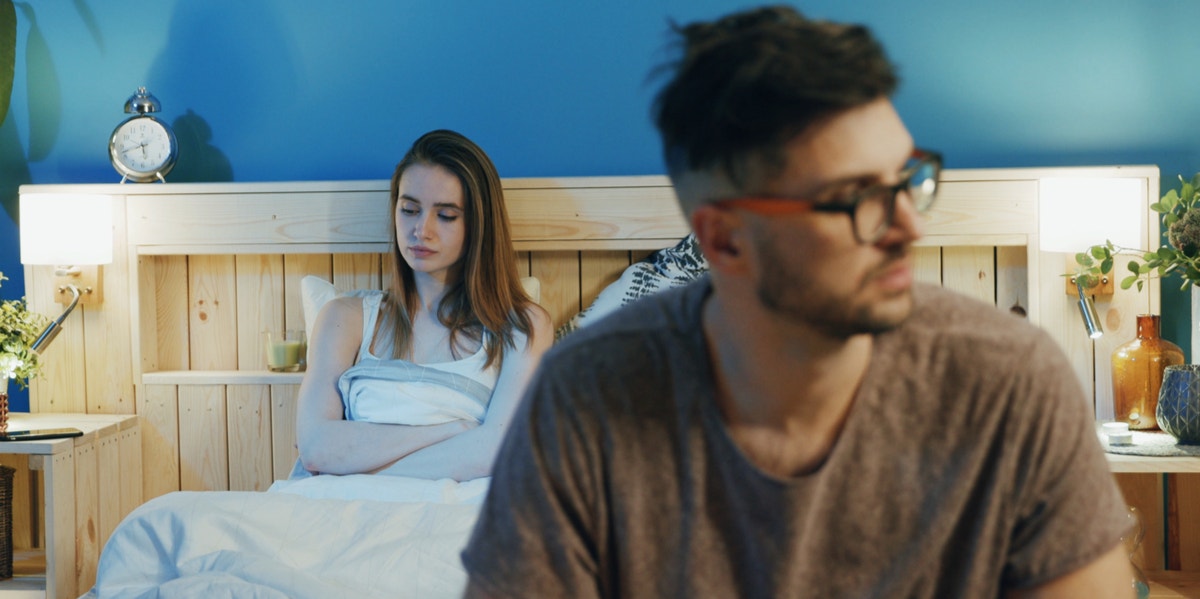The Real Reason You Continue To Love Those Who Are Bad For You
Real love isn't measured by how much pain you tolerate from your partner.
 Fractal Pictures / Shutterstock
Fractal Pictures / Shutterstock Some people choose alcohol, cocaine, weed, or various other drugs to fill the emotional wounds we all have. My drug of choice is people. Emotionally unavailable men, to be exact.
The first step in AA is admitting there is a problem, and it wasn’t until I experienced the lows of a particularly painful relationship that I came to terms with my addiction.
Like many, if not all people, my relationship issues can be traced back to my relationship with my parents. For whatever reason I was ashamed to acknowledge this, but the further along I got in my studies of psychology, the more I realized that ignoring my pain would only delay my healing.
The reality is, my absent father governs much of how I form relationships with others, especially men.
I put an overwhelming amount of pressure on myself to be the exception to the numerous statistics about Black children raised by single mothers.
I became desensitized to the pain in my life, not realizing how it was affecting a significant romantic relationship at the time.
I grew up with this individual and liked him for quite some time. It wasn’t until the summer before my sophomore year of college that this relationship evolved into hooking up, and for the past four years, I had the honorable misfortune of being his most consistent placeholder.
I watched as he began official relationships with different girls, anxiously waiting for him to see my worth and commit to me. Somehow he reassured me and insisted now wasn’t the right time, and naïvely, I believed him.
I remember texting a close friend, telling her about how much I prayed for the day he grew tired of using me. I couldn’t find the courage to break things off with him, and this was the only way I saw our relationship finally ending.
All the feelings I described of wanting to leave, while simultaneously feeling it was impossible to go through my everyday routine without him, were signs of a dysfunctional relationship.
What I swore was love, and reluctantly still believe is, was really codependency, a "relationship addiction."
This relationship was one-sided and an emotional bomb waiting to explode.
My inability to establish clear and appropriate boundaries in my relationship, biting my tongue in arguments in fear he would leave me, and simply using him as my source of solitude, were all indicative of my addiction.
The first part of my healing process was taking a simple (and free) online assessment to identify my attachment style.
It was easy for me to blame the guy I was dating at the time for being emotionally unavailable and manipulative. But it was far more challenging confronting the role I played in our relationship.
I wrongly believed that if only I could make this relationship work, then somehow this would reaffirm my worth, and prove that even though my father couldn’t love me, this man could.
The truth is I was petrified of the idea of being alone, which lead me to seek love and validation in everyone except myself.
My anxious and sometimes clingy tendencies made it impossible for me to see the reality of our situation more clearly. It hindered me from moving on, even when it was apparent how unhealthy we were for one another.
One of the reasons why I, as a Black woman, feel it is important to continue my academic career in psychology is to help destigmatize the negative stereotypes around therapy.
I was never sure what that would look like, or how I could even begin to tackle such a huge task, but I believe one of the first steps was to find the courage to share my story. I’d like to think therapy can provide us with the tools to adequately prepare for whatever journey lies ahead.
I'm tired of hiding behind the mask of being a strong Black woman.
I no longer see that as a compliment, especially when I am not allotted the privilege of being vulnerable. I am strong, not because of my ability to tolerate the BS of a man, but because I can find the courage to be brutally honest with myself to stand in my truth.
As the great Maya Angelou so eloquently said, “love liberates.” For me, this means that letting go of something or someone you love doesn’t mean you love them any less.
Real love isn’t measured by how much pain you tolerate from your partner.
True love says, you are not what I need right now, or I am not what you want, I love you, so go.
Unwritten is a website for millennials written and run by millennials. We’re committed to giving Generation-Y the discussion they need, whether it be a source of news, a much needed laugh, a comforting shoulder to cry on, or a place to have their own stories heard.

